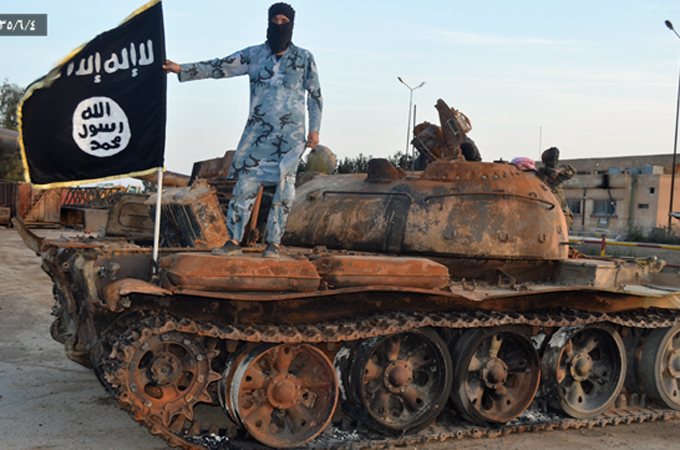Table of Contents

When attempting to justify a military response to ISIS’s spread across the Middle East, Western warhawks tend to focus on the why of an invasion rather than the how. A terrifying group of Islamic fundamentalists is rampaging across the Middle East, killing and occupying as they go, which to many is reason enough to try to hit them with all the firepower we’ve got.
However, the West tends to forget that moral outrage is not a sufficient case for invasion. In an area of the world so torn apart by civil war and sectarian violence, a botched military operation could result in disaster. A large-scale military response to ISIS should be completely off the table unless it has a significant probability of success with few repercussions. Unfortunately, no such military solution exists.
Before we get into the nitty-gritty, let’s first establish a few facts that warhawks like to ignore. First, contrary to popular belief, the ISIS crisis is not primarily a military problem. To be fair, bad guys with guns sounds like the military’s area of expertise. But the situation is far more complex than bad guys with guns.
The historical, ongoing conflict between Sunnis and Shias is at the heart of ISIS’s swift rise. ISIS is made up of Sunnis, but in Syria and Iraq, Shias are in power. For years the Shia-controlled Iraqi government has used its power to oppress Sunnis, arbitrarily arresting and executing scores in a bid to root out extremists and denying them representation in government. ISIS exploited popular resentment toward the Shia government to easily take over majority-Sunni areas, meeting little resistance as they went. Local Sunni tribes and rebel groups in both Iraq and Syria have struck non-aggression pacts with ISIS, which has further aided ISIS’s rapid spread. The rise of ISIS has political underpinnings that cannot be resolved with guns or bombs.
Second, the civil war in Syria presents a quandary for the US. The US is loath to intervene in the civil war between murderous dictator Bashar Al-Assad and various Sunni rebel groups, while Assad benefits immensely from Western airstrikes. With Western forces focused on ISIS in the north, the Syrian government has been able to covertly step up air raids on its opposition. Ultimately this harms the West’s larger strategic interest in engaging with moderate rebel groups to take down ISIS in Syria. Not only are rebels less effective as military partners if they face significant threats both from ISIS and from their government, but they are also less likely to partner with the US if they see us as tacitly allied with Assad. Once again politics complicates the military situation.
With this in mind, let’s examine why Western military action against ISIS cannot possibly be effective. First and foremost, dislodging ISIS requires partners on the ground that know the terrain and that can seize territory, which means engaging with local tribes and militias. However, the West has struggled to find reliable partners because many see intervention by the West as intervention on behalf of Shia governments at the expense of Sunni populations. That is why we’ve seen Sunni militias striking deals with ISIS in both Iraq and Syria even though they oppose militant Islam; despite ISIS’s radicalism, they ultimately see the government as a bigger threat.
Second, ISIS has managed to build strongholds around population centers in both Iraq and Syria. Stepped-up military operations will force ISIS to hide in these cities, resulting in violent street-to-street combat that is difficult to win and incurs tons of collateral damage. Earlier this year, for example, attempts to recapture Fallujah, in Iraq, were incredibly bloody and only moderately effective. More battles like those are highly unlikely to succeed.
Even the current, limited operations conducted by the West have been unsuccessful. ISIS relocated most of its assets, heavy weaponry, and members underground before strikes even began. Many reports conclude that ISIS’s capabilities have been relatively unaffected by Western airstrikes.
At the end of the day, realities on the ground render Western military action ineffective. To make matters worse, the long-term consequences of military action are dire. A military offensive risks deepening the political crisis that underpins ISIS’s spread, spurring Sunnis to side with ISIS in reaction to perceived oppression. Furthermore, ISIS knowingly exploits Sunni disillusionment with the government and its Western allies to recruit additional members. Military action may well entrench ISIS further.
Other militant groups in the region are equally concerning. Large-scale military operations may unite insurgent groups in a common fight against the West. Already the al-Nusra Front, a Syrian al-Qaeda affiliate, has promised retaliation to airstrikes aimed at ISIS. ISIS stands to benefit enormously if it teams up with Nusra Front or other al-Qaeda offshoots. The only thing worse than ISIS is ISIS with al-Qaeda’s resources at its disposal.
Ultimately, military operations simply don’t have a realistic chance of success. At a minimum they are risky enough that they should be off the table until we have a concrete plan to avoid the harms outlined above. However, this doesn’t mean that the West is powerless to try to dislodge ISIS.
The groups with the best military capabilities to combat ISIS are local militias and Sunni tribes, which have mostly remained passive up to this point. Nevertheless, many powerful tribes have indicated that they would be willing to turn on ISIS – so long as they are guaranteed rights by the new Iraqi government, which was formed last month. In particular, they want the US to use its influence to force those guarantees.
This could be a real game-changer for the ISIS crisis. Tribes insist that once they commit to resistance, “dealing with” ISIS won’t be difficult. History suggests this isn’t just warlords blowing smoke, as Sunni tribes played a key role in dislodging al-Qaeda in Iraq in 2006 and 2007. Al-Qaeda was only able to resurge because the Iraqi government inexplicably disbanded and jailed many indigenous military leaders years later. Already tribes have had success combating ISIS in the few instances where they’ve revolted, killing 16 in just one isolated clash near Fallujah in August.
These are rare encouraging signs in the fight against ISIS. The West should not endanger this progress. Instead, the West should acquiesce to Sunni calls for a political solution to the problems underlying ISIS’s rise. Indigenous forces on the ground can take it from there – and even if they can’t, at least the West can be satisfied that they aren’t making the situation worse.









